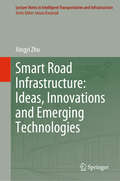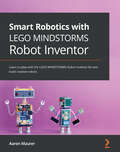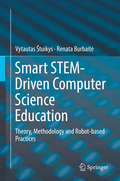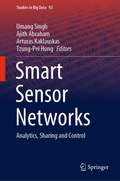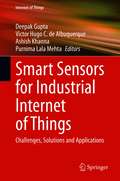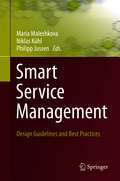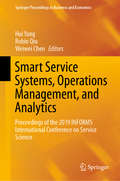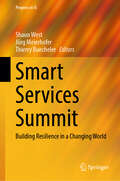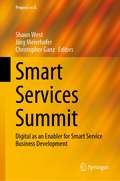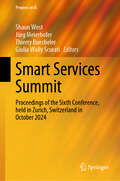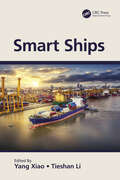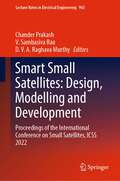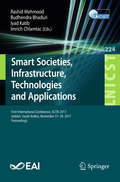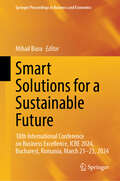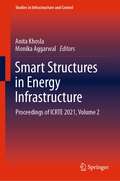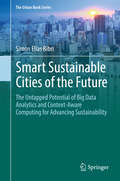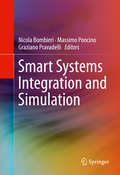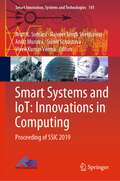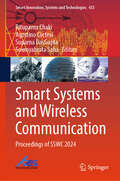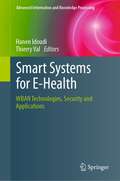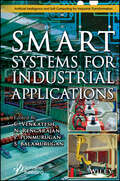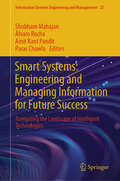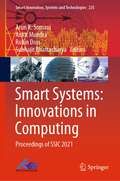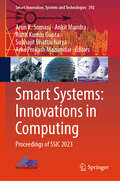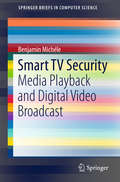- Table View
- List View
Smart Road Infrastructure: Ideas, Innovations and Emerging Technologies (Lecture Notes in Intelligent Transportation and Infrastructure)
by Xingyi ZhuThis book focuses on the fundamental ideas in the future smart transportation infrastructure systems that, in turn, give rise to new architectures and applications of emerging technologies. Although the scope of transportation infrastructure systems is very broad, this book focuses in detail on the main one—urban road infrastructure systems. Based on the investigation of the development trend and current situation of the smart road infrastructure (SRI), this book clarifies the connotation, architecture, and implementation path of the SRI. Emerging technologies related to SRI have also been summarized, which is useful for SRI design and construction. The book is intended for undergraduate and graduate students who are interested in the SRI technology or intelligent transportation systems and road/transportation design engineers working on relevant projects.
Smart Robotics with LEGO MINDSTORMS Robot Inventor: Learn to play with the LEGO MINDSTORMS Robot Inventor kit and build creative robots
by Aaron MaurerDiscover how to use the LEGO MINDSTORMS Inventor kit and boost your confidence in roboticsKey FeaturesGain confidence in building robots using creative designsLearn advanced robotic features and find out how to integrate them to build a robotWork with the block coding language used in robotics software in a practical wayBook DescriptionLEGO MINDSTORMS Robot Inventor is the latest addition to the LEGO MINDSTORMS theme. It features unique designs that you can use to build robots, and also enable you to perform activities using the robot inventor application. You'll begin by exploring the history of LEGO MINDSTORMS, and then delve into various elements of the Inventor kit. Moving on, you'll start working on different projects which will prepare you to build a variety of smart robots. The first robotic project involves designing a claw to grab objects, and helps you to explore how a smart robot is used in everyday life and in industry. The second project revolves around building a working guitar that can be played and modified to meet the needs of the user. As you advance, you'll explore the concept of biomimicry as you discover how to build a scorpion robot. In addition to this, you'll also work on a classic robotic challenge by building a sumobot. Throughout the book, you'll come across a variety of projects that will provide you with hands-on experience in building creative robots, such as building a Dragster, Egg Decorator, and Plankton from Spongebob Squarepants. By the end of this LEGO book, you'll have got to grips with the concepts behind building a robot, and also found creative ways to integrate them using the application based on your creative insights and ideas.What you will learnDiscover how the Robot Inventor kit works, and explore its parts and the elements inside themDelve into the block coding language used to build robotsFind out how to create interactive robots with the help of sensorsUnderstand the importance of real-world robots in today's landscapeRecognize different ways to build new ideas based on existing solutionsDesign basic to advanced level robots using the Robot Inventor kitWho this book is forThis book is for robot enthusiasts, LEGO lovers, hobbyists, educators, students, and anyone looking to learn about the new LEGO Robot Inventor kit. This book is designed to go beyond the basic build through to intermediate and advanced builds, and enables you to add your personal flair to the builds and codes.
Smart STEM-Driven Computer Science Education: Theory, Methodology and Robot-based Practices
by Vytautas Štuikys Renata BurbaitėAt the centre of the methodology used in this book is STEM learning variability space that includes STEM pedagogical variability, learners’ social variability, technological variability, CS content variability and interaction variability. To design smart components, firstly, the STEM learning variability space is defined for each component separately, and then model-driven approaches are applied. The theoretical basis includes feature-based modelling and model transformations at the top specification level and heterogeneous meta-programming techniques at the implementation level.Practice includes multiple case studies oriented for solving the task prototypes, taken from the real world, by educational robots. These case studies illustrate the process of gaining interdisciplinary knowledge pieces identified as S-knowledge, T-knowledge, E-knowledge, M-knowledge or integrated STEM knowledge and evaluate smart components from the pedagogical and technological perspectives based on data gathered from one real teaching setting. Smart STEM-Driven Computer Science Education: Theory, Methodology and Robot-based Practices outlines the overall capabilities of the proposed approach and also points out the drawbacks from the viewpoint of different actors, i.e. researchers, designers, teachers and learners.
Smart Sensor Networks: Analytics, Sharing and Control (Studies in Big Data #92)
by Ajith Abraham Tzung-Pei Hong Arturas Kaklauskas Umang SinghThis book provides IT professionals, educators, researchers, and students a compendium of knowledge on smart sensors and devices, types of sensors, data analysis and monitoring with the help of smart sensors, decision making, impact of machine learning algorithms, and artificial intelligence-related methodologies for data analysis and understanding of smart applications in networks. Smart sensor networks play an important role in the establishment of network devices which can easily interact with physical world through plethora of variety of sensors for collecting and monitoring the surrounding context and allowing environment information. Apart from military applications, smart sensor networks are used in many civilian applications nowadays and there is a need to manage high volume of demands in related applications. This book comprises of 9 chapters and presents a valuable insight on the original research and review articles on the latest achievements that contributes to the field of smart sensor networks and their usage in real-life applications like smart city, smart home, e-healthcare, smart social sensing networks, etc. Chapters illustrate technological advances and trends, examine research opportunities, highlight best practices and standards, and discuss applications and adoption. Some chapters also provide holistic and multiple perspectives while examining the impact of smart sensor networks and the role of data analytics, data sharing, and its control along with future prospects.
Smart Sensors for Industrial Internet of Things: Challenges, Solutions and Applications (Internet of Things)
by Deepak Gupta Ashish Khanna Victor Hugo C. de Albuquerque Purnima Lala MehtaThis book brings together the latest research in smart sensors technology and exposes the reader to myriad industrial applications that this technology has enabled. The book emphasizes several topics in the area of smart sensors in industrial real-world applications. The contributions in this book give a broader view on the usage of smart sensor devices covering a wide range of interdisciplinary areas like Intelligent Transport Systems, Healthcare, Agriculture, Drone communications and Security.By presenting an insight into Smart Sensors for Industrial IoT, this book directs the readers to explore the utility and advancement in smart sensors and their applications into numerous research fields. Lastly, the book aims to reach through a mass number of industry experts, researchers, scientists, engineers, and practitioners and help them guide and evolve to advance research practices.
Smart Service Management: Design Guidelines and Best Practices
by Maria Maleshkova Niklas Kühl Philipp JussenThis book presents the main theoretical foundations behind smart services as well as specific guidelines and practically proven methods on how to design them. Furthermore, it gives an overview of the possible implementation architectures and shows how the designed smart services can be realized with specific technologies. Finally, it provides four specific use cases that show how smart services have been realized in practice and what impact they have within the businesses.The first part of the book defines the basic concepts and aims to establish a shared understanding of terms, such as smart services, service systems, smart service systems or cyber-physical systems. On this basis, it provides an analysis of existing work and includes insights on how an organization incorporating smart services could enhance and adjust their management and business processes. The second part on the design of smart services elaborates on what constitutes a successful smart service and describes experiences in the area of interdisciplinary teams, strategic partnerships, the overall service systems and the common data basis. In the third part, technical reference architectures are presented in detail, encompassing topics on the design of digital twins in cyber physical systems, the communication between entities and sensors in the age of Industry 4.0 as well as data management and integration. The fourth part then highlights a number of analytical possibilities that can be realized and that can constitute or be part of smart services, including machine learning and artificial intelligence methods. Finally, the applicability of the introduced design and development method is demonstrated by considering specific real-world use cases. These include services in the industrial and mobility sector, which were developed in direct cooperation with industry partners.The main target audience of this book is industry-focused readers, especially practitioners from industry, who are involved in supporting and managing digital business. These include professionals working in business development, product management, strategy, and development, ranging from middle management to Chief Digital Officers. It conveys all the basics needed for developing smart services and successfully placing them on the market by explaining technical aspects as well as showcasing practical use cases.
Smart Service Systems, Operations Management, and Analytics: Proceedings of the 2019 INFORMS International Conference on Service Science (Springer Proceedings in Business and Economics)
by Hui Yang Weiwei Chen Robin QiuThis volume offers state-of-the-art research in service science and its related research, education and practice areas. It showcases recent developments in smart service systems, operations management and analytics and their impact in complex service systems. The papers included in this volume highlight emerging technology and applications in fields including healthcare, energy, finance, information technology, transportation, sports, logistics, and public services. Regardless of size and service, a service organization is a service system. Because of the socio-technical nature of a service system, a systems approach must be adopted to design, develop, and deliver services, aimed at meeting end users‘ both utilitarian and socio-psychological needs. Effective understanding of service and service systems often requires combining multiple methods to consider how interactions of people, technology, organizations, and information create value under various conditions. The papers in this volume present methods to approach such technical challenges in service science and are based on top papers from the 2019 INFORMS International Conference on Service Science.
Smart Services Summit: Building Resilience in a Changing World (Progress in IS)
by Shaun West Jürg Meierhofer Thierry BuechelerThis book presents up-to-date descriptions of Smart Services Innovations in industry, supported by new scientific approaches. It summarizes the outcomes of the fifth Smart Services Summit, held in Zurich in October 2023, which primarily focused on the ability of Smart Service Systems to support resilience and build sustainability. As the evolution of Smart Services accelerates, new technologies can be leveraged to create new value propositions and business models that deliver tangible sustainability outcomes. This book addresses social, economic, and environmental aspects of sustainability in connection with new technologies and includes papers on how these technologies can help achieve resilience and sustainability. In this context, topics such as sustainability and resilience in supply chains, X-as-a-Service, large language models for service automation, and location-based systems are discussed. Given its scope, the book represents an indispensable guide for practitioners and advanced students alike.
Smart Services Summit: Digital as an Enabler for Smart Service Business Development (Progress in IS)
by Shaun West Jürg Meierhofer Christopher GanzThis book offers state-of-the-art descriptions of intelligent service innovations in industry, supported by novel scientific approaches. It gathers findings presented at the 3rd Intelligent Services Summit, which took place in Zurich in September 2020, and chiefly focused on the design and application of Digital Twin as an enabler for business development in the field of smart services.Divided into three parts, the book addresses the challenges involved in the successful development and implementation of smart services for industry and science, ranging from data management to product design and lifecycle management. The four main aspects covered are industrial challenges, value system design (how to integrate resources into service ecosystems to create value), value creation through value proposition (how to create value for ecosystem actors), and value capture (how to create value for ecosystem businesses). Given its scope, the book offers an essential guide for practitioners and advanced students alike.
Smart Services Summit: Proceedings of the Sixth Conference, held in Zurich, Switzerland in October 2024 (Progress in IS)
by Shaun West Jürg Meierhofer Thierry Buecheler Giulia Wally ScuratiThis book presents up-to-date descriptions of smart service innovations in industry, supported by new scientific approaches. It summarizes the outcomes of the sixth Smart Services Summit, held in Zurich, Switzerland in October 2024, which primarily focused on digital co-creation in the smart services era and the transformative power of digital technologies and artificial intelligence in service ecosystems. The book explores the dynamics of value co-creation and examines how digital tools and artificial intelligence are enhancing interactions between service providers and consumers to innovate and improve service delivery. It covers a range of pertinent topics including the automation of customer engagement, the role of data analytics in understanding value perception, and the ethical considerations of AI in services. It also presents case studies that illustrate successful applications of AI in service design, offering readers a comprehensive view of how these technologies are fostering innovative co-creation practices. With contributions from leading academics and industry experts, this publication is essential for anyone interested in the future of service industries. It provides a scholarly yet accessible examination of how digital tools are not only reshaping service interactions but also establishing new paradigms for business and customer experiences in the digital age.
Smart Ships
by Yang Xiao Tieshan LiSmart shipping is a future method for transporting ocean cargo and exploring the resources of oceans for medical drugs, food, energy resources, and other products. A smart ship is an integration of shipping with many fields such as fishing, manufacturing, navigation, communication, computing, control, sensing, etc., to provide better shipping and services. The purpose of this edited book is to provide state‐of‐the‐art approaches and novel technologies for smart ships, covering a range of topics in these areas so that it will be an excellent reference book for the researchers, students, and professionals in these areas. It presents the fundamental technologies needed to build smart ships, and gives a clear explanation of them. This book will serve as a good reference for researchers to know the state of the art and to discover uncovered territory and develop new applications, as well as being a guideline for building future smart ships. Yang Xiao is a Full Professor in the Department of Computer Science at the University of Alabama, Tuscaloosa, Alabama, USA. Tieshan Li is a Full Professor in the School of Automation Engineering, University of Electronic Science and Technology of China, Chengdu, China.
Smart Small Satellites: Proceedings of the International Conference on Small Satellites, ICSS 2022 (Lecture Notes in Electrical Engineering #963)
by Chander Prakash V. Sambasiva Rao D. V. A. Raghava MurthyThis book comprises the select proceedings of the International Conference on Small Satellites and its Applications (ICSS) 2022. It aims to provide a comprehensive and broad-spectrum picture of the state-of-the-art research, development, and commercial perspective of various discoveries conducted in the real-world smart small satellites, applications and their services. The contents of this book focuses on efficient power management system, application-based optimum payload designs, telemetry and telecommand, advanced navigation and RF systems, flight and ground software’s, structure, mechanism and materials, space craft autonomy, quality, testing and reliability for designing the small satellites through advanced computational procedures for a variety of applications, etc. This book proves a valuable resource for those in academia and industry.
Smart Societies, Infrastructure, Technologies and Applications: First International Conference, SCITA 2017, Jeddah, Saudi Arabia, November 27–29, 2017, Proceedings (Lecture Notes of the Institute for Computer Sciences, Social Informatics and Telecommunications Engineering #224)
by Rashid Mehmood Budhendra Bhaduri Iyad Katib Imrich ChlamtacThis book constitutes the refereed post-conference proceedings of the First International Conference on Smart Cities, Infrastructures, Technologies and Applications, SCITA 2017, held in Jeddah, Saudi Arabia, in November 2017. The 35 revised full papers were carefully reviewed and selected from 62 submissions. The papers are grouped in topical sections: infrastructure track, e-governance and transportation track, healthcare track, applications track.
Smart Solutions for a Sustainable Future: 18th International Conference on Business Excellence, ICBE 2024, Bucharest, Romania, March 21–23, 2024 (Springer Proceedings in Business and Economics)
by Mihail BusuThis book presents a selection of the best papers from the 18th International Conference on Business Excellence, “Smart Solutions for a Sustainable Future” (ICBE 2024), held in Bucharest, Romania, in March 2024. In today's rapidly evolving landscape, characterized by volatility, uncertainty, complexity, and ambiguity (VUCA), the need to reshape business practices is of major importance. The book gathers research findings and perspectives on the new challenges in particularly in the field of digital economy and research systems. It focuses on the realignment of organizations and research systems offering valuable insights into the context of global crises and providing solutions to the real challenges we are facing today.
Smart Structures in Energy Infrastructure: Proceedings of ICRTE 2021, Volume 2 (Studies in Infrastructure and Control)
by Anita Khosla Monika AggarwalThis book gathers selected high-quality research papers presented at International Conference on Renewable Technologies in Engineering (ICRTE 2021) organized by Manav Rachna International Institute of Research & Studies, Faridabad, Haryana, India, during 15–16 April 2021. The book includes conference papers on the theme “Computational Techniques for Renewable Energy Optimization”, which aims to bring together leading academic scientists, researchers and research scholars to exchange and share their experiences and research results on all aspects of renewable energy integration, planning, control and optimization. It also provides a premier interdisciplinary platform for researchers, practitioners and educators to present and discuss the most recent innovations, trends and concerns as well as practical challenges encountered and solutions adopted in the fields of smart structures in energy infrastructure.
Smart Sustainable Cities of the Future: The Untapped Potential Of Big Data Analytics And Context-aware Computing For Advancing Sustainability (The Urban Book Series)
by Simon Elias BibriThis book is intended to help explore the field of smart sustainable cities in its complexity, heterogeneity, and breadth, the many faces of a topical subject of major importance for the future that encompasses so much of modern urban life in an increasingly computerized and urbanized world. Indeed, sustainable urban development is currently at the center of debate in light of several ICT visions becoming achievable and deployable computing paradigms, and shaping the way cities will evolve in the future and thus tackle complex challenges.This book integrates computer science, data science, complexity science, sustainability science, system thinking, and urban planning and design. As such, it contains innovative computer–based and data–analytic research on smart sustainable cities as complex and dynamic systems. It provides applied theoretical contributions fostering a better understanding of such systems and the synergistic relationships between the underlying physical and informational landscapes. It offers contributions pertaining to the ongoing development of computer–based and data science technologies for the processing, analysis, management, modeling, and simulation of big and context data and the associated applicability to urban systems that will advance different aspects of sustainability.This book seeks to explicitly bring together the smart city and sustainable city endeavors, and to focus on big data analytics and context-aware computing specifically. In doing so, it amalgamates the design concepts and planning principles of sustainable urban forms with the novel applications of ICT of ubiquitous computing to primarily advance sustainability. Its strength lies in combining big data and context–aware technologies and their novel applications for the sheer purpose of harnessing and leveraging the disruptive and synergetic effects of ICT on forms of city planning that are required for future forms of sustainable development. This is because the effects of such technologies reinforce one another as to their efforts for transforming urban life in a sustainable way by integrating data–centric and context–aware solutions for enhancing urban systems and facilitating coordination among urban domains.This timely and comprehensive book is aimed at a wide audience across science, academia industry, and policymaking. It provides the necessary material to inform relevant research communities of the state–of–the–art research and the latest development in the area of smart sustainable urban development, as well as a valuable reference for planners, designers, strategists, and ICT experts who are working towards the development and implementation of smart sustainable cities based on big data analytics and context–aware computing.
Smart Systems Integration and Simulation
by Nicola Bombieri Massimo Poncino Graziano PravadelliThis book-presents new methods and tools for the integration and simulation of smart devices. The design approach described in this book explicitly accounts for integration of Smart Systems components and subsystems as a specific constraint. It includes methodologies and EDA tools to enable multi-disciplinary and multi-scale modeling and design, simulation of multi-domain systems, subsystems and components at all levels of abstraction, system integration and exploration for optimization of functional and non-functional metrics. By covering theoretical and practical aspects of smart device design, this book targets people who are working and studying on hardware/software modelling, component integration and simulation under different positions (system integrators, designers, developers, researchers, teachers, students etc. ). In particular, it is a good introduction to people who have interest in managing heterogeneous components in an efficient and effective way on different domains and different abstraction levels. People active in smart device development can understand both the current status of practice and future research directions. · Provides a comprehensive overview of smart systems design, focusing on design challenges and cutting-edge solutions; · Enables development of a co-simulation and co-design environment that accounts for the peculiarities of the basic subsystems and components to be integrated; · Describes development of modeling and design techniques, methods and tools that enable multi-domain simulation and optimization at various levels of abstraction and across different technological domains.
Smart Systems and IoT: Proceeding of SSIC 2019 (Smart Innovation, Systems and Technologies #141)
by Arun K. Somani Sumit Srivastava Ankit Mundra Rajveer Singh Shekhawat Vivek Kumar VermaThe book features original papers from the 2nd International Conference on Smart IoT Systems: Innovations and Computing (SSIC 2019), presenting scientific work related to smart solution concepts. It discusses computational collective intelligence, which includes interactions between smart devices, smart environments and smart interactions, as well as information technology support for such areas. It also describes how to successfully approach various government organizations for funding for business and the humanitarian technology development projects. Thanks to the high-quality content and the broad range of the topics covered, the book appeals to researchers pursuing advanced studies.
Smart Systems and Wireless Communication: Proceedings of SSWC 2024 (Smart Innovation, Systems and Technologies #433)
by Agostino Cortesi Rituparna Chaki Suparna DasGupta Soumyabrata SahaThe volume is a collection of high-quality research papers presented at International Conference on Smart Systems and Wireless Communication, SSWC 2024, organized Department of Information Technology, JIS College of Engineering, Kalyani, West Bengal, India, during 29-30 November 2024. This book focuses smart cities, smart farming, smart healthcare, wireless networks communication, internet of things, cyber physical systems, human computer interaction, big data and data analytics, high performance computing, requirements engineering, analysis and verification techniques, security systems, distributed systems, biometrics, bioinformatics, robotic process automation, and machine learning.
Smart Systems for E-Health: WBAN Technologies, Security and Applications (Advanced Information and Knowledge Processing)
by Hanen Idoudi Thierry ValThe purpose of this book is to review the recent advances in E-health technologies and applications. In particular, the book investigates the recent advancements in physical design of medical devices, signal processing and emergent wireless technologies for E-health. In a second part, novel security and privacy solutions for IoT-based E-health applications are presented. The last part of the book is focused on applications, data mining and data analytics for E-health using artificial intelligence and cloud infrastructure. E-health has been an evolving concept since its inception, due to the numerous technologies that can be adapted to offer new innovative and efficient E-health applications. Recently, with the tremendous advancement of wireless technologies, sensors and wearable devices and software technologies, new opportunities have arisen and transformed the E-health field. Moreover, with the expansion of the Internet of Things, and the huge amount of data that connected E-health devices and applications are generating, it is also mandatory to address new challenges related to the data management, applications management and their security. Through this book, readers will be introduced to all these concepts. This book is intended for all practitioners (industrial and academic) interested in widening their knowledge in wireless communications and embedded technologies applied to E-health, cloud computing, artificial intelligence and big data for E-health applications and security issues in E-health.
Smart Systems for Industrial Applications (Artificial Intelligence and Soft Computing for Industrial Transformation)
by S. Balamurugan N. Rengarajan C. Venkatesh P. PonmuruganSMART SYSTEMS FOR INDUSTRIAL APPLICATIONS The prime objective of this book is to provide an insight into the role and advancements of artificial intelligence in electrical systems and future challenges. The book covers a broad range of topics about AI from a multidisciplinary point of view, starting with its history and continuing on to theories about artificial vs. human intelligence, concepts, and regulations concerning AI, human-machine distribution of power and control, delegation of decisions, the social and economic impact of AI, etc. The prominent role that AI plays in society by connecting people through technologies is highlighted in this book. It also covers key aspects of various AI applications in electrical systems in order to enable growth in electrical engineering. The impact that AI has on social and economic factors is also examined from various perspectives. Moreover, many intriguing aspects of AI techniques in different domains are covered such as e-learning, healthcare, smart grid, virtual assistance, etc. Audience The book will be of interest to researchers and postgraduate students in artificial intelligence, electrical and electronic engineering, as well as those engineers working in the application areas such as healthcare, energy systems, education, and others.
Smart Systems: Navigating the Landscape of Intelligent Technologies (Information Systems Engineering and Management #22)
by Álvaro Rocha Shubham Mahajan Amit Kant Pandit Paras ChawlaIn an era where technology is rapidly advancing, Smart Systems: Engineering and Managing Information for Future Success offers a comprehensive exploration of cutting-edge technologies that are reshaping industries and societies. This book delves into the integration of Artificial Intelligence (AI), Internet of Things (IoT), cloud computing, and advanced data analytics to create smarter systems that drive innovation and efficiency across various sectors.
Smart Systems: Proceedings of SSIC 2021 (Smart Innovation, Systems and Technologies #235)
by Robin Doss Arun K. Somani Ankit Mundra Subhajit BhattacharyaThis book features original papers from the 3rd International Conference on Smart IoT Systems: Innovations and Computing (SSIC 2021), presenting scientific work related to smart solution concepts. It discusses scientific works related to smart solutions concept in the context of computational collective intelligence consisted of interaction between smart devices for smart environments and interactions. Thanks to the high-quality content and the broad range of the topics covered, the book appeals to researchers pursuing advanced studies.
Smart Systems: Proceedings of SSIC 2023 (Smart Innovation, Systems and Technologies #392)
by Arun K. Somani Ankit Mundra Subhajit Bhattacharya Rohit Kumar Gupta Arka Prokash MazumdarThe book features original papers from the 4th International Conference on Smart IoT Systems: Innovations in Computing (SSIC 2023), organized by Manipal University, Jaipur, India during 26 – 27 October 2023. It discusses scientific works related to data engineering in context of computational collective intelligence consisted of interaction between smart devices for smart environments and interactions. Thanks to the high-quality content and the broad range of the topics covered, the book appeals to researchers pursuing advanced studies.
Smart TV Security
by Benjamin MichéleThis book discusses the emerging topic of Smart TV security, including its implications on consumer privacy. The author presents chapters on the architecture and functionality of Smart TVs, various attacks and defenses, and associated risks for consumers. This includes the latest attacks on broadcast-related digital services and built-in media playback, as well as access to integrated cameras and microphones. This book is a useful resource for professionals, researchers and students engaged with the field of Smart TV security.
